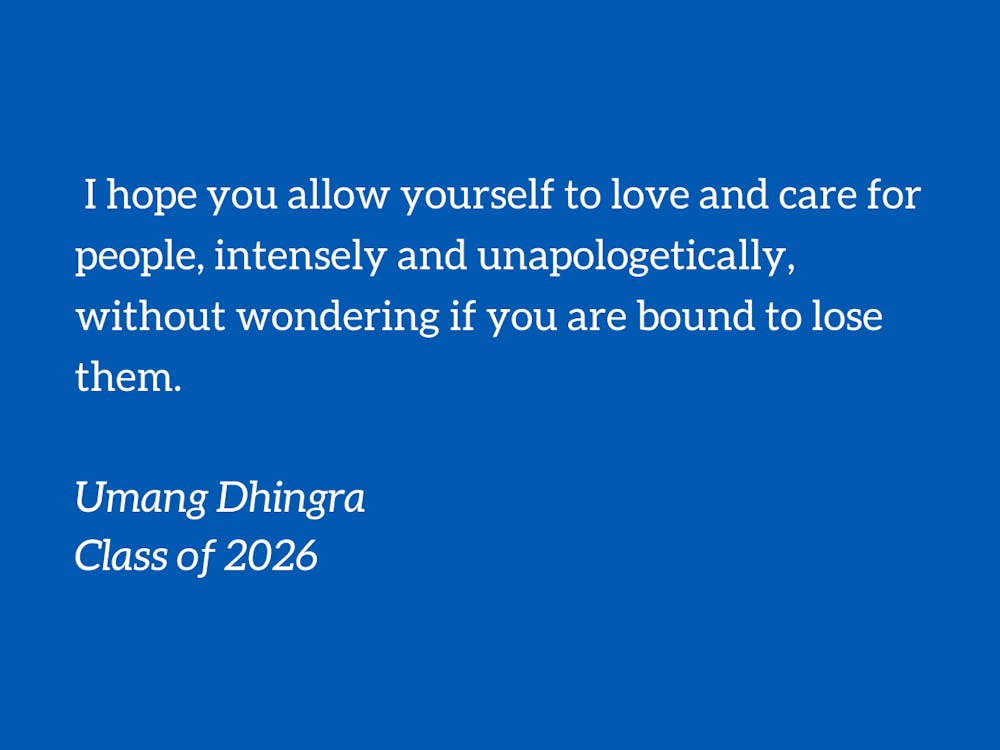For the first month after the new semester starts, my calendar is typically decked out for every meal — plans with friends I haven’t seen in a while and dinners with professors I have to catch up with, brunches with clubs and girls’ nights. A month filled with, “Tell me about your summer,” “Do you think you know what you’re doing after college?” and “Where are you staying this year?” And just as quickly as the calendar fills up, it dwindles. Lunches turn into quick conversations in the hallway and dinners morph into waving at WU. It’s understandable: life gets hectic, priorities change, and the weight of classes and extracurriculars begins to hang heavy. Maintaining friendships gets more and more buried on the to-do list. Most people I talk to on campus are knowledgeable, kind and wonderful — how do I decide which friendships to invest in? Which ones will last when I graduate? Who do I want to see at the ten-year reunion, and who do I want to see over Christmas break?
College and, by extension, the relationships it brings, is intrinsically ephemeral. In the grand scheme of things, these four years stand out as a space of liminality, of constant and pervasive change. Like few other experiences in life, when you are in college, there is an inevitable end always in sight, amidst all-nighters, parties and crises of faith. You hope that the learning, the memories and the friendships linger past graduation day, but you can’t know that they will. To wonder if any of this means anything, then, is natural.
As sad as it is to consider that these relationships may dwindle over time, it doesn’t reduce their value in the present. Any level of belonging and comfort that we are offered leaves an indelible mark on us. My signature still looks like the one my sixth-grade best friend and I drew as a joke at the back of our notebooks. I haven’t spoken in years to the boy who introduced me to my favorite singer. A colleague I didn’t know before this summer has forever changed my makeup game with her fantastic (and ferociously gate-kept) mascara hack. To reduce the value of friendships to whether they last a lifetime is ultimately a myopic view. Love, irrespective of how present it is in our lives, is never not valuable. It leaves us as different, more nuanced people than we were before. To be vulnerable and forgiving might be rewarded in the form of a lifelong friendship, but it ultimately means something bigger — it shows us we are capable of fostering relationships with others, things that connect us to our own humanness.
I don’t mean to say one should be impetuous with the people they choose to spend time with or lean towards having very many surface-level friendships over sharing deeper connections. All I mean is the question of which friendships to invest in based purely on whether they will stay beyond school is moot. Irrespective of how many promises you make right now, life is far too elusive to guarantee permanence. To demand a “forever” from every relationship that means something to us right now is naive. Our best of intentions disappear with age, replaced by priorities, practicality and logic — I know my middle-school self is disappointed in me for spending my 20s as a student at Duke and not a lovelorn artist wandering the streets of Rome.
When faced with the reality that none of our friendships here have temporal permanence baked into them, we must contend with their value that has nothing to do with time. It has to do with everything we add to each other’s lives right now. I have been at Duke for a little over two years now, and I am a completely different, better person than I was when I came in — it is no small part because of the kindness, the warmth and the support of the people I was surrounded by. The value in our friendships comes from the impact we let it have on us and what we offer in turn for it.
No one knows who we will become, to each other or otherwise, when we leave this university. Will I be someone you call to tell all the crazy things you do in your 20s, or simply be someone who finds out about them through social media? What we do have is now. We have our silly WU dinners and people to wave at in the main quad, professors to catch up with and girls’ nights. Just for right now, I hope you don’t wonder, “what are we, anyway?” I hope you allow yourself to love and care for people, intensely and unapologetically, without wondering if you are bound to lose them. I hope, at least for these four years, you take space in other people’s lives and let them take space in yours. The clock is ticking anyway. Don’t let the chance to be brave — or better yet, to be human — pass you by.
Umang Dhingra is a Trinity junior. Her pieces typically run on alternative Mondays.
Get The Chronicle straight to your inbox
Sign up for our weekly newsletter. Cancel at any time.

